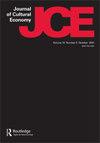Poor counts as viable accounts: numbers, forecasting, and routinization in Greece
IF 1.9
3区 社会学
Q1 CULTURAL STUDIES
引用次数: 0
Abstract
ABSTRACT After a revision to a projected deficit figure in 2009 touched off deep recession and austerity, much scrutiny and skepticism focused on the role of economic forecasts, statistics, and experts in the nearly decade-long ‘Greek crisis.’ This article takes an ethnographic approach to macroeconomic forecasting, examining it both as a process through which numbers come to exert profound effects and a charged object of popular concern for the ways in which this happens. It asks how to reconcile the lack of popular faith in forecasts with their ability to persist as objects of attention. Through tracking the making and circulation of forecasts, I answer this question by demonstrating what numbers do. Specifically, I argue that the fundamental work of forecasting consists in how it renders numbers routine means of thinking about the economy and its future. I show how numbers carry out this work through their ability to at once describe and represent, such that contention over descriptions of the economy nevertheless routinizes representations of it. This argument points to a type of performativity that occurs through routinization and it presents an understanding of the multivalence of numbers that can inform critical approaches to quantification, objectification, and expertise.在希腊,穷人被认为是可行的账户:数字、预测和程序化
2009年对预计赤字数字的修正引发了严重的经济衰退和财政紧缩,许多审查和怀疑都集中在经济预测、统计数据和专家在持续近十年的希腊危机中的作用上。本文采用人种学的方法来研究宏观经济预测,既将其视为数字产生深远影响的过程,又将其视为公众关注的对象,因为这种影响是如何发生的。它提出的问题是,如何调和大众对预测缺乏信心与预测作为关注对象持续存在的能力之间的矛盾。通过跟踪预测的制作和循环,我通过展示数字的作用来回答这个问题。具体来说,我认为预测的基本工作在于如何将数字作为思考经济及其未来的常规手段。我展示了数字是如何通过它们同时描述和代表的能力来完成这项工作的,这样,关于经济描述的争论就会使它的表现常规化。这一论点指出了一种通过常规化发生的表演性,它提出了对数字的多重价值的理解,可以为量化、客观化和专业知识的关键方法提供信息。
本文章由计算机程序翻译,如有差异,请以英文原文为准。
求助全文
约1分钟内获得全文
求助全文

 求助内容:
求助内容: 应助结果提醒方式:
应助结果提醒方式:


